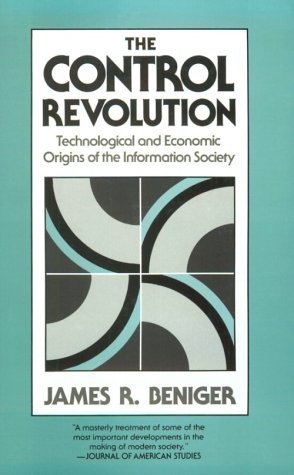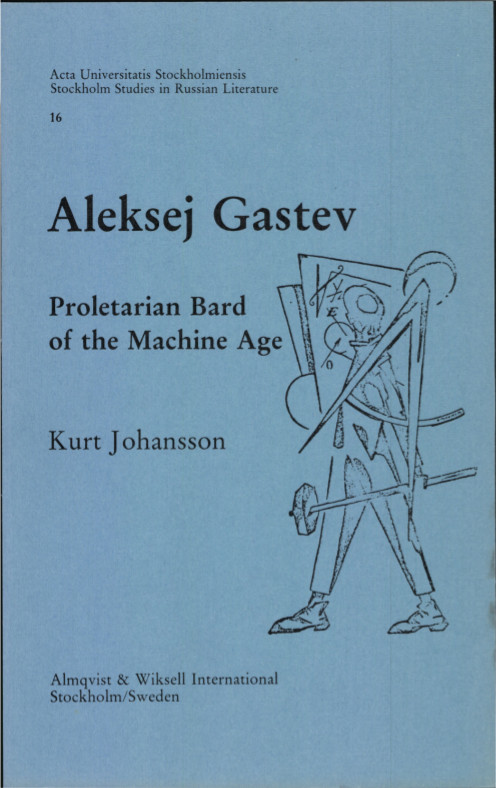James R. Beniger: The Control Revolution: Technological and Economic Origins of the Information Society (1986)
Filed under book | Tags: · advertising, agriculture, bureaucracy, computing, cybernetics, economy, energy, history of technology, industrial revolution, industry, information society, management, mass media, radio, society, technology, telegraphy, telephone, television, transport

“James Beniger traces the origin of the Information Society to major economic and business crises of the past century. In the United States, applications of steam power in the early 1800s brought a dramatic rise in the speed, volume, and complexity of industrial processes, making them difficult to control. Scores of problems arose: fatal train wrecks, misplacement of freight cars for months at a time, loss of shipments, inability to maintain high rates of inventory turnover. Inevitably the Industrial Revolution, with its ballooning use of energy to drive material processes, required a corresponding growth in the exploitation of information: the Control Revolution.
Between the 1840s and the 1920s came most of the important information-processing and communication technologies still in use today: telegraphy, modern bureaucracy, rotary power printing, the postage stamp, paper money, typewriter, telephone, punch-card processing, motion pictures, radio, and television. Beniger shows that more recent developments in microprocessors, computers, and telecommunications are only a smooth continuation of this Control Revolution. Along the way he touches on many fascinating topics: why breakfast was invented, how trademarks came to be worth more than the companies that own them, why some employees wear uniforms, and whether time zones will always be necessary.”
Publisher Harvard University Press, 1986
ISBN 0674020766, 9780674020764
493 pages
via babyalanturing
Review (JoAnne Yates, The Journal of Interdisciplinary History, 1988)
Review (Krishan Kumar, Journal of American Studies, 1988)
Review (Kirkus Reviews)
Book-inspired website
Publisher
PDF (16 MB, updated on 2016-6-16)
Comment (0)Matthew Fuller, Andrew Goffey: Evil Media (2012)
Filed under book | Tags: · algorithm, art, artificial intelligence, business, code, computing, data, database, event, governance, information, interaction, interface, knowledge, labour, language, machine, management, market, media, media theory, memory, military, networks, philosophy, political theory, politics, power, programming, software

“Evil Media develops a philosophy of media power that extends the concept of media beyond its tried and trusted use in the games of meaning, symbolism, and truth. It addresses the gray zones in which media exist as corporate work systems, algorithms and data structures, twenty-first century self-improvement manuals, and pharmaceutical techniques. Evil Media invites the reader to explore and understand the abstract infrastructure of the present day. From search engines to flirting strategies, from the value of institutional stupidity to the malicious minutiae of databases, this book shows how the devil is in the details.
The title takes the imperative “Don’t be evil” and asks, what would be done any differently in contemporary computational and networked media were that maxim reversed.
Media here are about much more and much less than symbols, stories, information, or communication: media do things. They incite and provoke, twist and bend, leak and manage. In a series of provocative stratagems designed to be used, Evil Media sets its reader an ethical challenge: either remain a transparent intermediary in the networks and chains of communicative power or become oneself an active, transformative medium.”
Publisher MIT Press, 2012
ISBN 0262304406, 9780262304405
235 pages
Review: Nicholas Holm (Media Int’l AU, 2013), Neural (2013).
Evil media on Monoskop wiki
PDF (updated on 2024-4-13)
HTML (added on 2015-8-28)
See also YoHa, et al., Evil Media Distribution Centre, 2013.
Comments (2)Kurt Johansson: Aleksej Gastev: Proletarian Bard of the Machine Age (1983)
Filed under book | Tags: · 1910s, biography, machine, management, poetry, proletariat, russia, taylorism

This book attempts to give an outline of Aleksej Gastev’s life and works primarily up until 1920.
Aleksej Gastev (1882-1941?) belonged to the Russian proletarian intelligentsia. He was an active revolutionary, a journalist with syndicalist leanings, a metal-worker and trade-union leader, and one of the best proletarian poets. In later years he became perhaps the most important champion of the Taylor system and scientific management in Russia; as the founder and leader of the Institute of Labour (CIT) in Moscow he trained hundreds of thousands of new workers for Soviet industry. In 1938 he fell a victim to the Stalinist terror.
Besides presenting his biography, the present study tries to trace the development of Gastev’s Utopian ideas about the creation of a New Man suited to the industrial society of the future. In his articles and poems the worker is so Intimately fused with machines that he adopts their rhythm and functional movements, himself becoming “mechanical”. One chapter is specially devoted to Gastev’s poetry, the collection Poézija rabočego udara (“The Poetry of the Factory Floor”). Four prose poems are analyzed in detail. These describe the future development of the proletariat, and also show how Gastev ‘s manner of writing gradually becomes a kind of “Taylorized” poetry, that has been strongly influenced by futurism.
Publisher Almqvist & Wiksell International, Stockholm, 1983
Stockholm Studies in Russian Literature series
ISBN 9122006141
170 pages
PDF (updated on 2013-12-8)
Comment (0)
